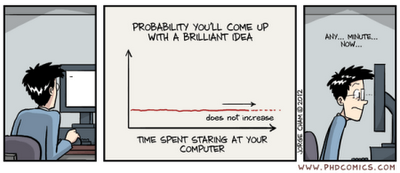Guest Post: Catherine Neish on Remaining competitive and sane: The 40 hour work week in science?
Catherine Neish is presently a postdoctoral fellow at the Johns Hopkins University Applied Physics Laboratory, and will be starting a NASA Postdoctoral Fellowship at Goddard Space Flight Center later this summer. Her research focuses on radar remote sensing of planetary bodies, such as Titan and the Moon.
Remaining competitive and sane: The 40 hour work week in science?
The forty hour work week. It?s a standard length for many American workers, but it seems to represent more of a lower limit for many scientists. Discussing your plans for evening or weekend work is not unusual in our field; indeed, in this competitive, type A environment some may argue it's necessary for success.
I'd like to suggest it's not. Indeed, I think many of us could be better scientists if we worked forty hours a week. Or less.
Not that I don't feel the impulse to work. I do. I worked hard throughout my K-12 education and on through my undergraduate degree in astronomy. It seems quite distant now, but there was a time in my life when my almost all of my time was spent in class or doing homework assignments. I remember one occasion when I had to pull myself away from my quantum mechanics homework to see a wonderful display of the Leonids meteor shower (and boy I'm glad I did!).
But in graduate school something changed. I worked hard, but I took evenings off to spend time with friends, to exercise, or simply to relax at home. If friends were going on a hike in the mountains, I would take a few days off to join them. I was a productive scientist, publishing four papers before graduation, but I am not convinced I worked more than 35 hours a week.
Out of graduate school and working a "real job" at a large laboratory, I found myself putting in longer hours and juggling several projects at once. And while I'm still productive, I don't feel as creative or innovative as I did in graduate school. I began to wonder if long hours may be hindering our collective productivity as scientists. And it turns out there's some research to back this up.
In the book ?Imagine: How creativity works?, Johan Lehrer explores where innovative thoughts come from. He concludes that people in a relaxed state and a good mood are far more likely to develop innovative or creative thoughts. Speaking on NPR?s ?Fresh Air,? Lehrer states:
"When you look at where insights come from, they come from where we least expect them. They only arrive after we stop looking at them. If you're an engineer working on a problem and you're stumped by your technical problem, chugging caffeine at your desk and chaining yourself to your computer, you're going to be really frustrated. You're going to waste lots of time. You may look productive, but you're actually wasting time. Instead, at that moment, you should go for a walk. You should play some ping-pong. You should find a way to relax."
It's been called the "shower principle," the idea that inspiration comes when your mind is as ease (say, for example, when you?re taking a shower). My father once told me that the major breakthrough in his PhD research came when he was walking across a parking lot, and I?m sure many of you have had similar ?ah ha!? moments. Jorge Cham described this graphically in one PhD comic:

?Piled Higher and Deeper? by Jorge Cham (used with permission)
In addition to heightened creativity, there are other benefits to a shorter work week - spending time with family and friends, developing skills outside of science, improving your health through exercise. I hope to be a parent one day, and still wonder how I can raise two babies - my scientific career and my child - at the same time.
I recognize that some weeks may require more than 40 hours. But with some planning, or simply the use of the word 'no', I think we can reduce much of the scramble to complete last minute deadlines. I think each of us can find a way to remain both competitive and sane, and I think science will be the better off for it.
- Lyrid Meteor - Another Meteor Shower This April
I love to watch meteor shower , and my previous post describes about Leonid meteor shower . Coming this week on 22nd April Lyrid meteor peaks . Lyrid meteor is named after its constellation from where it originates and it peaks on 22nd April a day after...
- Career Profiles: Astronomer To University Administrator In A Center For Teaching & Learning
The AAS Committee on the Status of Women in Astronomy and the AAS Employment Committee have compiled dozens of interviews highlighting the diversity of career trajectories available to astronomers. The interviews share advice and lessons...
- Career Profiles: Astronomer To Astrophysicist At The Nasa Goddard Space Flight Center
The AAS Committee on the Status of Women in Astronomy and the AAS Employment Committee have compiled dozens of interviews highlighting the diversity of career trajectories available to astronomers. The interviews share advice and lessons learned from...
- Quality Family Time
Winter break is a wonderful time. If you're a younger grad student, it's a welcome respite from classes. If you're an older grad student or a postdoc, it's a welcome respite from hordes of undergrads. If you're pre-tenure faculty like...
- Aaswomen For May 18th, 2012
AAS Committee on the Status of Women Issue of May 18, 2012 eds. Joan Schmelz, Caroline Simpson, and Michele Montgomery [This week's guest editor is Daryl Haggard. Daryl is a postdoctoral fellow in the Center for Interdisciplinary Exploration and...
